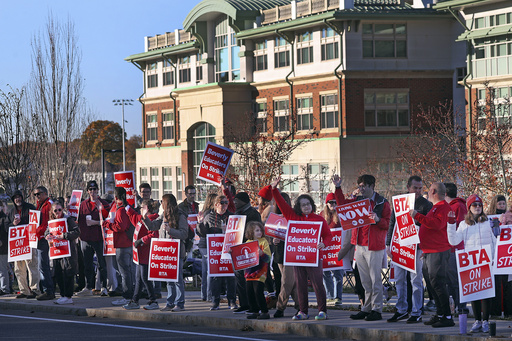
BOSTON — Educators in two Massachusetts school districts initiated a strike on Friday, advocating for better pay, parental leave, and various other demands. The educators in Beverly and Gloucester authorized the strike through a vote on Thursday, resulting in school closures on Friday as teachers took to the picket lines. While the districts are only a short distance apart, their strikes are independent from one another.
The Beverly Teachers Association has expressed its desire for reduced class sizes in the district, which serves around 4,500 students. They are also requesting 12 weeks of paid parental leave and a “living wage” for paraprofessionals, whose starting salaries are currently set at $20,000. Julia Brotherton, co-president of the Beverly Teachers Association, emphasized the situation, stating, “Due to inadequate support for our students and insufficient salaries for our paraprofessionals, our educators have reached their limit.”
Brotherton further criticized the negotiations, claiming that the school committee has been unproductive. “They have delayed discussions on multiple proposals, such as our plans for extended lunch and recess, as well as permitting teachers to utilize their sick leave to care for sick family members. Their inaction is contributing to staff turnover, which severely impacts our students’ education,” she added.
In response, Rachael Abell, the chair of the Beverly School Committee, condemned the strike, labeling it as an unfair disturbance to students’ education. “It’s essential to clarify that the School Committee does not support the illegal actions of the BTA,” she stated. Abell noted that the committee would collaborate with state officials to minimize educational disruption and called for teachers to return to school while engaging in good-faith negotiations.
Meanwhile, in Gloucester, the local union, which represents about 2,800 students, is advocating for eight weeks of fully paid parental leave, along with two weeks at 75% pay and two weeks at 50%. They are also seeking significant salary increases for paraprofessionals, improved safety conditions for students, and additional preparation time for elementary school teachers. Rachel Rex, co-president of the Union of Gloucester Educators, stated, “Educators have been striving for safe, adequately staffed schools, competitive salaries, and respect. Unfortunately, the School Committee has only stalled and rejected our proposals, resulting in feelings of being overlooked and exploited among educators.”
The Gloucester School Committee expressed disappointment over the union’s decision to strike. “This action will impede student learning and halt after-school programs and athletics, leaving parents in a difficult position regarding childcare with little to no advance notice,” they said in a statement. The committee accused the Gloucester Teachers Association of prioritizing political agendas over the safety and educational needs of students.
Teacher strikes are not common in Massachusetts due to state regulations that prevent public sector employees from striking. The most recent incident occurred earlier this year in Newton, a suburb of Boston, where an 11-day strike concluded with an agreement reached. This strike was recognized as the sixth teachers’ strike in the state since 2022 and was notably the longest duration. The resulting agreements included a 13% cost-of-living raise over four years for teachers, increased pay for classroom aides, and 40 days of fully paid family leave.
